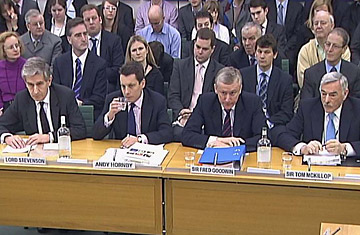
Dennis Stevenson, former chairman of HBOS; Andy Hornby, former chief executive of HBOS; Fred Goodwin, former chief executive of Royal Bank of Scotland; and Tom McKillop, former chairman of Royal Bank of Scotland, appearing at the Treasury Select Committee in London
If apologies from bank bosses could stimulate the economy, Britain's would be outgrowing China's just now. As the former execs in charge of two of the U.K.'s largest banks appeared before a committee of Members of Parliament on Tuesday to account for their role in the financial meltdown, the bankers gave out "sorry"s like mortgage-backed securities.
Andy Hornby, the former chief exec of HBOS, which was taken over last year by rival Lloyds to prevent a run on the bank, said he was "extremely sorry for the turn of events." Dennis Stevenson, Hornby's chairman at HBOS — which, along with Lloyds, got a $25 billion bailout from the government in return for 43% of the combined group — was "profoundly and unreservedly" apologetic. And really giving it his all, Fred Goodwin, ex-boss of the Royal Bank of Scotland (RBS), rescued by British taxpayers last fall with an even bigger bailout, said he "could not be more sorry." (See pictures of London's financial crisis.)
In truth, the apologies — much like the banks' dodgiest assets — are of limited value these days. Failures at HBOS and RBS forced the British government into a $55 billion bailout in October, saddling it with more than a trillion pounds (roughly $1.4 trillion) in liabilities. In a jam-packed committee room, the former bankers picked over their biggest mistakes. Shelling out some $15 billion for a chunk of rival Dutch lender ABN Amro in mid-2007 — when all the signs were pointing to a testing time for banks — was "a big mistake," Tom McKillop, RBS's former chairman, told the committee.
Following the collapse in September of U.S. investment bank Lehman Brothers, RBS's depleted capital reserves — a consequence of that ABN deal — meant "the spotlight fell on us, and the share price dropped 60% in two days," Goodwin said. Added McKillop: "We are sorry we bought ABN Amro." At HBOS, said Hornby, who stepped down as its CEO in 2008 after only two years in the job, "years of reliance on wholesale funding left us in a vulnerable position." No kidding. When the meltdown in those markets occurred, HBOS was history. "The fundamental mistake that HBOS made was," said Stevenson, "it failed to predict wholesale collapse of wholesale markets."
Still, for all the needling — bankers were submitted to three hours of lawmakers' questions — taxpayers got little in the way of detail about how or why the banks blew it. Stevenson insisted the HBOS board "was all over" risk management and "stress-testing." It was external factors, he said, that ultimately did it for the bank. Goodwin claimed that at "no point did anyone get the scale or the speed of [the slowdown], and that was what was so damaging about this."
More tempting for the MPs: the issue of bankers' pay. Goodwin, who said he went without a bonus last year after stepping down eight years into the job, admitted he has lost $7.4 million as RBS shares have plummeted. Amid reports that the bank plans to pay its existing staff bonuses for 2008, all four former execs agreed that changes to the bonus system should be looked at. Hornby reckoned that bonuses "do not reward the right kind of behavior" and suggested they be tied more closely to long-term performance. The 42-year-old, who also went without a bonus in 2008, confessed to losing "considerably more money than I have been paid" at HBOS thanks to his earlier bonuses being awarded in shares. Not that he's asking us to say sorry.
